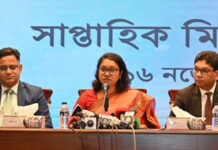The forgotten ones
Families of two Holey Artisan staffers seek justice

Sitting at her home in Narayanganj’s Siddhirganj, a feeble-looking Maksuda Begum stares vacantly into the distance. She mumbles most of the time making her words difficult to catch.
“I am exhausted … I’ve lost all my strength trying to seek justice for my son,” she says.
Maksuda’s eldest son Zakir Hossain Shaon, 19, was a kitchen help at the Holey Artisan Bakery in the capital’s Gulshan diplomatic zone. He was found bloodied and battered near the upscale café when the five gunmen were still inside it on the night of July 1, 2016.
Shaon died of his wounds a week later at Dhaka Medical College Hospital (DMCH) while under police custody. He had suffered splinter wounds and there were “marks of beating” on his body, said sources at the hospital morgue.
Right after the grisly attack that left 20 hostages including 17 foreigners dead, police said they suspected Shaon’s involvement with the five terrorists.
But their investigation did not find any such links.
In the chargesheet of the Holey Artisan case, police said Shaon and another staffer of the bakery, Saiful Islam Chowkidar — both killed in the incident — were “victims of accident”.
The government gave 15,000 euros or about Tk 13.95 lakh to each of the families of the 20 hostages, but the families of the two got nothing.
Two police officers, killed in the standoff with the five terrorist, also got compensation from police.
Since the attack, Maksuda, in her 50s, has been doing her best to prove that police tortured her son to death, but all the efforts have apparently gone in vain.
She didn’t even get the autopsy report, she said.
After Shaon’s death, police had said he died of his injuries suffered in the attack, brushing aside the allegation of torture.
Talking to these correspondents at her Siddhirganj home on Friday, Maksuda once again posed a question: “Should we not seek justice because my son was killed by police?”
Asked why she did not file any case against police, she said, “Nobody stood beside us, nobody cared for us.”
Shaon had called Maksuda over phone hours before the attack to tell her that he had received his Eid bonus and would be going home on July 3 after receiving his salary.
Maksuda said police called her three days later and told her that her son was at the DMCH.
As she rushed to the hospital, she saw Shaon lying on a bed with a saline drip injected into one of his hands. “I can never forget that sight. There were injury marks all over his body. The body had swelled up.”
“Sir, I am not a militant. Please don’t beat me,” Maksuda quoted her son as telling a policeman inside the hospital.
Among his four siblings, Shaon was the eldest and an earning member of the family. His father is a day-labourer. Maksuda sold cakes at roadside tea stalls to supplement the income of her husband Sattar.
“Police took away my son just on suspicion. Are they so blind that they can’t even differentiate between a criminal and an innocent person? Couldn’t they verify before labelling my son a militant?” she asked.
Sattar said his son was struggling hard to change the fate of his family, but their world turned upside down with his tragic death.
“One of my sons does not work while another has physical disability. My daughter has to work at a garment factory to support our family,” he said, adding that they did not get any compensation from the government.
‘WAS NOT EVEN ALLOWED TO BURY MY HUSBAND’
The other staffer, Saiful, 34, a pizza chef, died during the commando operation launched in the morning of July 2 to end the café siege.
His family members were not even allowed to see his body, let alone bury it, they said, adding a narrative was circulated in the media that the family did not want to receive the body for burial.
Sixty-five days after the attack, Saiful was buried along with the five gunmen at the city’s Jurain graveyard by Anjuman Mufidul Islam, a social welfare organisation that buries unclaimed bodies.
“We went everywhere, but they didn’t even let us see the body,” lamented Saiful’s wife Sonia Akhter, who was seven-month pregnant when her husband died.
From Shariatpur’s Naria upazila, Saiful worked at the Gulshan café for 18 months. He had learnt baking in Germany where he had stayed for about 10 years.
Saiful would call his pregnant wife every night, but that did not happen on July 1, 2016.
After Sonia learnt about the attack from a television channel, she desperately called Saiful over his mobile phone only to get no response.
Later in the morning, Sonia learnt that all the staffers of the café were safe.
But then came the devastating news.
Four days later, news agency Reuters quoting police reported that one of the men the law enforcers shot dead during the siege may have been a hostage killed by mistake.
However, police later said both Shaon and Saiful were on their list of suspects.
In July last year, police pressed charges against eight of the 21 militants in the Holey Artisan attack case. In the chargesheet, the law enforcers said the attackers wanted to destabilise Bangladesh by initiating the country’s worst-ever terror incident.
Saiful and Shaon were not named as accused in the charge sheet which said, “Both of them are staffers of Holey Artisan Bakery and none of them had involvement with any terrorist activity or direct or indirect links with the attackers/terrorist. They are just victims of accident.”
Asked whether the two were “collateral damage”, Monirul Islam, chief of the DMP’s Counter Terrorism and Transnational Crime (CTTC) unit, at a press conference had said their investigation could not ascertain how they were killed.
The CTTC boss also said they did not find any previous links of Shaon and Shaiful with the attackers.
Saiful’s family too did not get any compensation, except for Tk 10,000 which it gets every month from the café owners.
Saiful’s son, Hasan, was born a week after his burial. He is now three. Saiful’s two daughters — Samia and Ilmy — are students of class VI and IV respectively.
Talking to these correspondents, Sonia, around 30, said now that the chargesheet says her husband was innocent, they want to get rid of all the stigma which came with the attack.
“My husband was not a terrorist, still he was branded one. We want justice for what happened to us,” she said.









